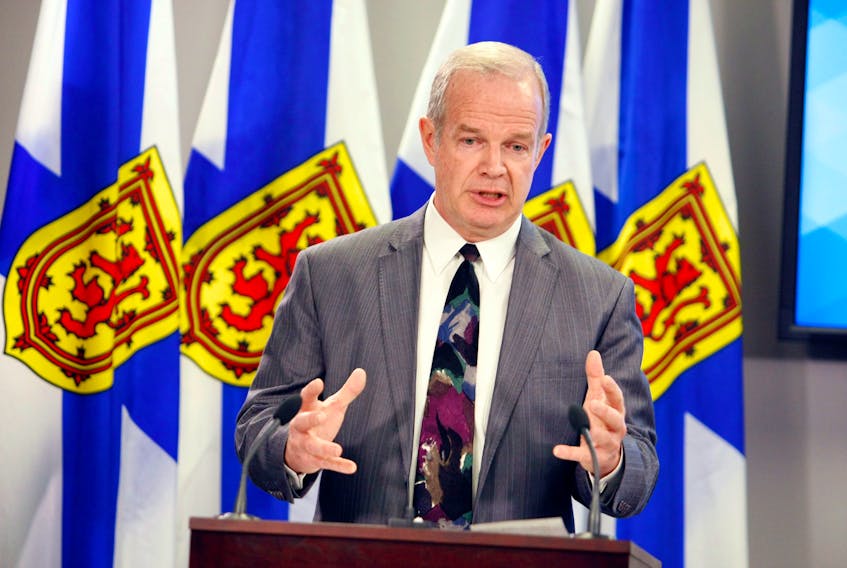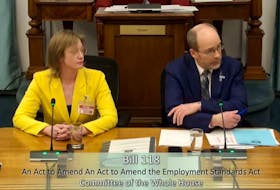Justice Minister Mark Furey ordered a provincewide moratorium on street checks Wednesday but stopped short of permanently banning the controversial police tool or offering a formal apology to African Nova Scotians.
“I can stand here and apologize,” said Furey in response to a reporter’s inquiry. “Is that going to change anything?”
For Vanessa Fells, it would. The program co-ordinator of the African Nova Scotian Decade for People of African Descent Coalition was subjected to one memorable street check back in 2006.
Two Halifax Regional Police officers confronted her as she exited a bus in north-end Halifax with a laptop computer in hand. An area resident and Saint Mary’s University student at the time, she refused the officers’ demand to provide her name. She was then asked to produce a receipt for the computer she was carrying.
Fells eventually negotiated her way out of the encounter but she carries the humiliation and anger with her.
“An apology from the government would acknowledge the systematic racism that so many members of the African Nova Scotia community have been subjected to by the police in Halifax but also in this province,” said Fells, during an interview after the news conference. “I think the government played a big role in letting that happen.”
On Wednesday Furey ordered a provincewide stop to police checks on pedestrians and passengers in motor vehicles. The directive stated “no activity conducted by police, including a traffic stop, can be done based on discrimination, including race.”
The move comes 21 days after a human rights report that recommended banning or strictly regulating street checks in the province. In the report University of Toronto criminologist Scot Wortley found black Nova Scotians were stopped and questioned by police six times more frequently than whites and the controversial practice has “contributed to the criminalization of black youth, eroded trust in law enforcement and undermined the perceived legitimacy of the entire criminal justice system.”
Furey, a former police officer, maintained his view that police checks are a valuable policing tool when used with discretion. Rather than opting for a permanent ban he chose a temporary halt to carding while a stakeholder committee works to adopt several recommendations from Wortley’s report and ultimately comes up with regulations on street checks.
The road ahead for street checks
He said the African Nova Scotian Decade for People of African Descent Coalition would be invited to participate in the working group that will include police, the Halifax board of police commissioners, Human Rights Commission and African Nova Scotian Affairs.
The committee would be working toward short and long-term targets, he said. But the minister offered no timeline for when street check regulations would be completed.
“The inappropriate use of street checks is alarming and unacceptable,” said Furey. “Public trust in policing is essential.”
Fells said she’s pleased by the invitation but insists the group has been calling for a permanent ban since January 2017 when the Halifax police released data showing black men in Halifax were three times more likely than whites to be subject to street checks.
“There is very little trust between the African Nova Scotia community and the police and justice system as a whole,” she said. “That there’s a temporary ban shows that the government is starting to listen.”
She says street checks are the product of racial discrimination and for progress to be made the police have to work on re-establishing trust with African Nova Scotian communities.
Besides an apology from the province, the coalition is also looking for an apology from Halifax Regional Police and RCMP.
Furey said a formal government apology could come after future discussions. The Chronicle Herald inquired with the Halifax Regional Police to see whether the department is considering the same but did not get an immediate response.
But the department did release a statement on behalf of acting chief Robin McNeil saying that action is being taken to implement the moratorium.
“Like any changes to policies and practices, we expect there will be a period of adjustment, both for the public and our employees,” said McNeil.
Furey said all 1,900 police officers in the province would have to enroll in a behaviour training course.
Furey continued to defend his decision not to call the moratorium immediately after the release of Wortley’s report. He said he needed time for public consultation.
Both the opposition NDP and Progressive Conservative parties supported the moratorium. NDP Justice critic Claudia Chender has been fierce opponent of street checks and called the Wednesday’s news “an important and long-overdue first step in addressing the discriminatory practice of street checks in our province.”
RELATED:
- Halifax police commission pushes for suspension of street checks
- Minister lacks resolve to end street checks, El Jones says
- Street checks in Nova Scotia should be banned or tightly regulated, report says
- Atlantic Police Academy session covers street checks, racial profiling
- ‘The right thing to do is ban street checks’









